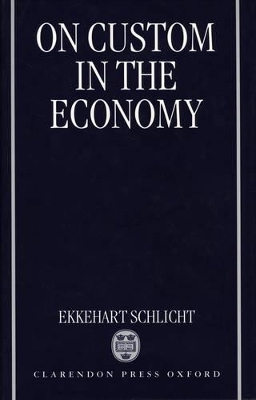
On Custom in the Economy
Seiten
1998
Oxford University Press (Verlag)
9780198292241 (ISBN)
Oxford University Press (Verlag)
9780198292241 (ISBN)
This book seeks to reintroduce the notion of custom in economics by providing a link between market processes, which are much analysed, and customary elements, which have been neglected by economists or at best seen as routines that have been adopted because they were competitively successful. Schlicht draws on philosophy and psychology in addition to economics.
The aim of this book is to re-establish custom in economics. Current economic theorizing largely neglects the customary forces that underpin market exchange. Economic sociologists have stressed this repeatedly by referring to the 'embeddedness' of all kinds of economic processes. It is true that market processes do hinge on elements of custom, but custom is in turn moulded by economic processes. This other causal direction needs more attention than it has hitherto received. The way modern institutional economics has developed points to the same deficiency. Institutional economics initially tried to analyse economic institutions as arising from market processes and competition whilst avoiding reference to all elements of custom, but it became increasingly clear that answers obtained in this fashion were critically dependent on tacit underlying assumptions about the customary infrastructure.
Another current strand of thought, notably originating with game theory, has tried to understand the emergence of customs by viewing them as routines that have been adopted because of their success. This approach views customs essentially as conventions that solve coordination problems. It is driven by the economic paradigm that interprets behaviour as fully reducible to the interplay of (given) preferences and constraints whilst neglecting the direct motivational impact of custom. The second aim of the book is thus to systematically harmonize the motivational significance of custom with institutional theorizing. The re-establishment of custom in economics will provide foundations for institutional economics which reduce the arbitrariness of current thinking.
The aim of this book is to re-establish custom in economics. Current economic theorizing largely neglects the customary forces that underpin market exchange. Economic sociologists have stressed this repeatedly by referring to the 'embeddedness' of all kinds of economic processes. It is true that market processes do hinge on elements of custom, but custom is in turn moulded by economic processes. This other causal direction needs more attention than it has hitherto received. The way modern institutional economics has developed points to the same deficiency. Institutional economics initially tried to analyse economic institutions as arising from market processes and competition whilst avoiding reference to all elements of custom, but it became increasingly clear that answers obtained in this fashion were critically dependent on tacit underlying assumptions about the customary infrastructure.
Another current strand of thought, notably originating with game theory, has tried to understand the emergence of customs by viewing them as routines that have been adopted because of their success. This approach views customs essentially as conventions that solve coordination problems. It is driven by the economic paradigm that interprets behaviour as fully reducible to the interplay of (given) preferences and constraints whilst neglecting the direct motivational impact of custom. The second aim of the book is thus to systematically harmonize the motivational significance of custom with institutional theorizing. The re-establishment of custom in economics will provide foundations for institutional economics which reduce the arbitrariness of current thinking.
Introduction ; 1. A Web of Reinforcements ; 2. Entitlements and Obligations ; 3. Smooth and Lumpy Changes ; 4. Fuzziness ; 5. Adaptive Custom ; 6. Clarity ; 7. Rules and Schemata ; 8. Rule Preference ; 9. Attribution and Motivation ; 10. Custom and Style ; 11. Property ; 12. The Law ; 13. The Firm ; 14. The Division of Labour ; 15. The Texture of Custom ; Appendices ; A Notes on Method ; B The Principle of Relativity ; C Hume's Law ; References ; Index
| Erscheint lt. Verlag | 26.3.1998 |
|---|---|
| Zusatzinfo | halftones, line figures |
| Verlagsort | Oxford |
| Sprache | englisch |
| Maße | 147 x 224 mm |
| Gewicht | 568 g |
| Themenwelt | Geisteswissenschaften ► Philosophie ► Logik |
| Wirtschaft ► Allgemeines / Lexika | |
| Wirtschaft ► Volkswirtschaftslehre | |
| ISBN-13 | 9780198292241 / 9780198292241 |
| Zustand | Neuware |
| Informationen gemäß Produktsicherheitsverordnung (GPSR) | |
| Haben Sie eine Frage zum Produkt? |
Mehr entdecken
aus dem Bereich
aus dem Bereich


